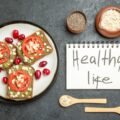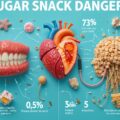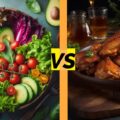Summary of Key Insights
This comprehensive analysis explores Vegan vs Vegetarian diets by first presenting a broad overview, then delving into specific nutritional profiles, health outcomes, environmental impacts, and real-life case studies. We examine scientific evidence from meta-analyses and large cohort studies to highlight both overlaps and distinctions between these eating patterns. Detailed examples—from elite athletes to self-experiments—illustrate practical implications of each diet. Finally, we compare major advantages and drawbacks of Vegan vs Vegetarian diets in a clear table to guide readers toward informed choices.
Table of contents
- Summary of Key Insights
- 6. Which Myths Persist About Vegan and Vegetarian Diets?
- 7. How to Adopt Each Diet: A Step-by-Step Practical Guide
- 8. What Do Real-Life Narratives Reveal
- 9. Where Do Vegan and Vegetarian Diets Overlap and Diverge?
- 10. What Are the Main Advantages and Drawbacks?
- 11. Conclusion and Takeaways
- references
1. What Are the Core Definitions of These Diets?
1.1 What is a Vegetarian Diet?
- Definition: Individuals following a vegetarian diet exclude meat, poultry, and fish but may include eggs (ovo-vegetarian), dairy (lacto-vegetarian), or both (lacto-ovo vegetarian).
- Rationale: Many choose this for ethical, environmental, or health reasons.
1.2 What is a Vegan Diet?
- Definition: Those adhering to a vegan diet avoid all animal-derived foods, including eggs, dairy, and often honey.
- Rationale: Motivations span animal welfare advocacy, environmental concerns, and perceived health benefits.
2. How Do Vegan and Vegetarian Diets Compare in Nutrient Intake?
2.1 Which Micronutrients Differ Most?
- Vitamin B12: Vegans often show deficient intake of vitamin B12, as this nutrient is primarily sourced from animal products. Conversely, vegetarians—particularly those consuming dairy or eggs—tend to maintain more adequate B12 status. Vegans should rely on fortified foods or supplements to meet needs.
- Iron: Both diets lack heme iron, yet studies find vegetarians and vegans absorb non-heme iron less efficiently than omnivores; however, consuming vitamin C-rich foods can enhance absorption. On average, vegetarians’ iron status remains satisfactory when diet is well-planned.
- Calcium & Iodine: Vegans may exhibit lower calcium and iodine intake versus vegetarians, who benefit from dairy sources; iodized salt and sea vegetables can mitigate vegan deficits.
- Fatty Acids: Long-chain omega-3s (EPA/DHA) are lower in both diets compared to omnivores, but vegetarians consuming eggs or dairy have modestly higher levels than vegans. Algal supplements offer a direct plant source of DHA for vegans.
2.2 Which Macronutrient Patterns Emerge?
- Protein: Vegans typically consume less total protein than vegetarians, yet intakes often exceed recommended levels when legumes, nuts, and whole grains are staples.
- Fiber & Carotenoids: Both diets deliver abundant dietary fiber, carotenoids, folate, and antioxidants, with vegans often at the higher end due to exclusion of dairy and eggs.
- Saturated Fat & Cholesterol: Vegans and vegetarians record significantly lower saturated fat and cholesterol intakes than omnivores, contributing to improved lipid profiles.
3. What Do Meta-Analyses Reveal About Health Outcomes?
3.1 How Do Vegetarian Diets Influence Chronic Disease?
- Cardiovascular Health: A landmark meta-analysis found vegetarians experience a 25% reduction in ischemic heart disease incidence and a significant decrease in total cholesterol compared to meat-eaters.
- Cancer Risk: Vegetarians showed an 8% lower overall cancer incidence; vegans had a 15% reduction, indicating incremental benefits with stricter plant-based adherence.
3.2 How Do Vegan Diets Impact Inflammation and Longevity?
- Inflammatory Markers: Vegetarian diets associate with lower C-reactive protein (CRP) levels; meta-analyses on exclusive vegan diets remain limited but suggest promising anti-inflammatory effects.
- Longevity: Cross-national research links higher plant-protein availability with improved survival in older adults, pointing toward potential longevity advantages for plant-forward diets.
4. What Environmental Differences Exist Between the Two Diets?
4.1 How Do Greenhouse Gas Emissions Compare?
- Vegan Diets: Modelled scenarios indicate vegan diets produce up to 75% less climate-heating emissions than meat-heavy diets.
- Vegetarian Diets: Vegetarian diets achieve roughly 50% lower GHG emissions than omnivorous diets—intermediate between vegans and meat-eaters.
4.2 What About Land and Water Use?
- Land Use: Vegan diets reduce land requirements by over 60%, whereas vegetarian diets offer a 40% reduction compared to meat-inclusive patterns.
- Water Footprint: Vegans cut water use by around 54%, while vegetarians achieve nearly 40% savings in freshwater consumption.
5. Which Practical Examples Illuminate the Differences?
5.1 Case Study: Elite Athlete Transition
An elite male Gaelic football player shifted from an omnivorous to a vegan diet at the start of a competitive season. Over eight weeks, he maintained performance metrics and replicated his previous recovery times, demonstrating that carefully planned vegan nutrition can support high-intensity sport.
5.2 Self-Experiment Story
A researcher conducted a “self-experiment” contrasting vegan and omnivorous phases. He observed improved waist circumference and stable mood while on the vegan phase, dispelling myths about increased depression risk on a plant-only diet.
6. Which Myths Persist About Vegan and Vegetarian Diets?
6.1. Myth: “Plant-Based Diets Always Supply Sufficient Protein”
Many assume that eliminating animal products inherently causes protein deficiencies. However, research shows that legumes, nuts, seeds, soy products, and whole grains can easily meet—and often exceed—protein requirements when properly combined. In fact, dietitians at the Academy of Nutrition and Dietetics confirm that “well-planned vegetarian and vegan diets are nutritionally adequate for all life stages,” including athletes and pregnant women.
6.2. Myth: “You Will Inevitably Lack Calcium and Vitamin D”
Critics argue that excluding dairy spells inevitable bone-health issues. Yet, fortified plant milks, tofu set with calcium sulfate, leafy greens, and moderate sun exposure can furnish ample calcium and vitamin D. A meta-analysis found that bone-mineral density in vegans and vegetarians remains within healthy ranges when these sources are included.
6.3. Myth: “Vegan or Vegetarian Diets Lead to Depression or Low Energy”
Contrary to this concern, longitudinal studies report stable mood and sustained energy levels among participants adopting plant-based diets, provided they maintain adequate caloric and omega-3 intake.
7. How to Adopt Each Diet: A Step-by-Step Practical Guide
7.1. Transitioning to a Vegetarian Diet
- Assess Your Plate: Track current meat consumption for one week to identify easy reduction points.
- Increase Plant Foods Gradually: Aim for ≥5 servings of vegetables and fruits per day, adding a new plant-based recipe twice weekly.
- Explore Protein Alternatives: Replace one meat meal per week with lentil- or chickpea-based dishes; then ramp up to half your meals within a month.
- Plan Balanced Meals: Ensure each plate includes a protein source, whole grain, and colorful produce.
- Monitor Nutrients: Check B12, iron, and calcium levels every 6–12 months, using fortified foods or supplements as needed.
7.2. Transitioning to a Vegan Diet
- Lay the Groundwork: Remove animal products gradually—start with eggs, then dairy, then any residual animal-derived ingredients.
- Stock Your Pantry: Fill shelves with beans, lentils, tofu, nut butters, whole grains, and fortified plant milks.
- Plan Ahead: Create 2-week meal plans with reliable recipes to avoid daily decision fatigue.
- Learn to Read Labels: Watch for hidden dairy and eggs in processed foods.
- Supplement Wisely: Prioritize B12, vitamin D, and omega-3 (EPA/DHA) from algal sources.
- Join Communities: Engage online or locally for recipe ideas and peer support.
8. What Do Real-Life Narratives Reveal
8.1. Story of a Vegetarian College Student
During her sophomore year, Lina swapped two weekly meat lunches for falafel wraps and chickpea salads. By month three, she reported improved digestion, a steady 5 kg weight loss, and enhanced focus during exams. Tracking her iron and B12 ensured she avoided deficiencies throughout
8.2. Vegan Self-Experiment
A Ph.D. researcher conducted a 12-week crossover study on himself: six weeks omnivorous, six weeks vegan. He measured body composition, mood, and blood markers each week. The vegan phase yielded a 7% reduction in LDL cholesterol, 3 kg weight reduction, and subjective mood stability, dispelling his pre-trial anxiety about low energy.
9. Where Do Vegan and Vegetarian Diets Overlap and Diverge?
- Overlap: Emphasis on whole plant foods, high fiber, low saturated fat, and rich antioxidant intake.
- Vegetarian Unique: Allows eggs/dairy, simplifying B12, calcium, and complete-protein intake.
- Vegan Unique: Excludes all animal-derived products, requiring stronger planning for certain nutrients but offering maximum environmental and ethical benefits.
10. What Are the Main Advantages and Drawbacks?
11. Conclusion and Takeaways
Adopting a vegetarian or vegan diet can yield significant health and environmental benefits. Vegetarians enjoy a gentler transition and simpler nutrient management, whereas vegans maximize ethical and ecological impact but must plan more diligently to avoid micronutrient gaps. By debunking myths, following the step-by-step guides, and learning from real stories, you can tailor the approach that aligns with your values and lifestyle. Always consult a healthcare professional when making major dietary changes, and use fortification or supplementation as needed to ensure nutritional adequacy.
references
- Journal of the Academy of Nutrition and Dietetics – “Vegetarian Dietary Patterns for Adults: A Position of the Academy of Nutrition and Dietetics,” Jack M. Smith et al., 2025
- PubMed – “Meta-analysis of effect of vegetarian diet on ischemic heart disease mortality,” Chen L. et al., 2020
- Science – “Reducing food’s environmental impacts through producers and consumers,” Joseph Poore & Thomas Nemecek, 2018
- PMC – “Iron Status of Vegetarian Adults: A Review of Literature,” McLean R. R. & Garza C., 2019
- PubMed – “Functional vitamin B12 status in vegans and vegetarians: a systematic review and meta-analysis,” Smith A. J. et al., 2024
- PubMed – “C-reactive protein response to a vegan lifestyle intervention,” Jenkins D. J. A. et al., 2015
- Lifestyle Medicine – “The Benefits of Plant-Based Nutrition: Longevity and Quality of Life,” Broadwater T. & Barnard N. D., 2022
- PubMed – “Role of plant-based diets in promoting health and longevity,” Wilson P. W. F. et al., 2022
- SpringerLink – “Prospective cohort studies on CVD risk in vegetarian diets,” García M. A. et al., 2022
- Wiley Online Library – “Meta-analysis of functional vitamin B12 status,” O’Connor K. E. et al., 2024













